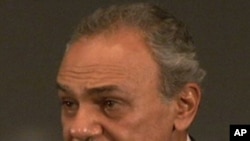While many energy analysts are predicting a sharp increase in oil prices in the coming months as a worldwide economic recovery takes hold and demand from China and India increases, Saudi Arabia says it will work to mitigate that rise. Saudi Prince Turki Al Faisal Al Saud says his country has the capacity to play that role for some decades to come.
In his speech to energy industry representatives and academics at the Baker Institute for Public Policy at Rice University, Prince Turki Al Faisal Al Saud emphasized his nation's commitment to a stable oil market. He said the Kingdom of Saudi Arabia's ample oil reserves of over 264 billion proven barrels give it the power to offset sharp increases in demand.
"As the demand for oil continues to rise, especially in China and India, the kingdom has every intention of meeting that demand," said the prince.
Prince Turki said his nation supports a price somewhere between $70 and $80 a barrel. The current price is approaching $90 a barrel, but he gave no indication that Saudi Arabia is planning any immediate action.
The Saudi prince called on countries like China and India to be more transparent in reporting their energy consumption in order to have a more efficient international energy market.
"In order for the markets to operate properly, we must work together to make sure that all nations have the resources and incentives to publish accurate and valuable information on their energy supplies and uses," he said.
Prince Turki also taunted those in the United States who call for energy independence, when, he said, interdependence is a more realistic and desirable goal. He referred to the recent Deepwater Horizon disaster as a consequence of seeking oil in risky environments in order to reduce oil imports.
"To literally go to the ends of the earth to retrieve oil is probably not the wisest long-term energy strategy, especially when a country like Saudi Arabia has so much oil that can be safely retrieved," said the Saudi Prince.
Alternative energies
But Prince Turki said his nation supports the development of alternative energies to compliment the use of oil. He spoke of his nation's move towards more natural gas production as well as development of solar power and an electric grid for the region and beyond.
"Whatever solar power retrieval can be had in our part of the world and North Africa can feed the needs and requirements of Europe and one can imagine an eastward-bound grid as well going to countries like Pakistan and India," he said.
Prince Turki cited Saudi Arabia's abundant sunshine as a potential resource that might one day rival its oil.
While some energy experts in the audience were skeptical about such ambitious plans, the Baker Institute's Amy Myers Jaffe saw great potential.
"All the countries of the Middle East have electricity shortages. If Saudi Arabia was going to take a leadership role in building a regional grid or participating in natural gas grids in the region, that would make a huge difference," said Jaffe.
Call for transparency
As for the Saudi prince's call for more transparent reporting on energy use in China and other large consumer nations, Jaffe says this could help control speculation and stabilize the market.
"There are questions about Chinese oil demand," said Jaffe. "Were they buying for their strategic reserve or was that fundamental growth in demand? When the market cannot know for sure you get these movements in price."
But Jaffe said Saudi Arabia and other producer nations in the Organization of Petroleum Export Countries (OPEC) should be more open to outside assessments of their reserves and production capacity. More transparency, she said, would help prevent wild swings in oil prices such as the big spike and subsequent crash that occurred a couple of years ago.




